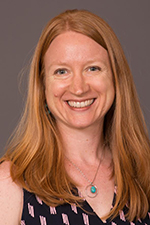
+
Interview
Could you tell us a little bit about the courses that you teach with a community-engagement component?
Currently I teach FSOS 1211--An Interdisciplinary Look at Family in Multicultural America, and EDHD 1525W- First Year Inquiry with community engaged learning. Students in these courses work in the community at a variety of sites including schools, libraries, food shelves, shelters for families experiencing homelessness, and more. Each course has their own curated list of partners based on the topics we are covering. The First Year Inquiry course has the goal of helping students see how one person can make a difference, and FSOS 1211 is a look at family systems framed through the lens of the human ecology model. EDHD 1525W has an intensive set of reflection and writing assignments associated with their work in the community and FSOS 1211 includes a more robust skills-based component where the students learn how to write field notes.
Can you tell us about the assignments in these courses and what you hope your students accomplish through completing them?
Both of my classes are set up utilizing a direct-service framework, and the organizations I work with are interested in partnering with my courses because they are looking for ways to attract younger volunteers to their youth-focused programs. Since this is the case, the assignments that I have constructed for the courses are focused on helping students unpack the ideas of what it means to make a difference, affect change, and what it means to enter into communities and/or family systems in a volunteering role regardless if the community is similar to or different from the communities where they grew up. It is supremely important to me that my courses do not reify the idea that change is created through “helping” or that exposure to a new community is enough to gain deep learning about that community, so it is important to me that the reflections and field note processes address these issues. I see it as my job to ask meaningful questions of my students and push back when necessary/appropriate to help move their thinking forward.
How did you decide to have field notes as a major course assignment in FSOS 1211?
I have my students complete field notes in FSOS 1211 as a primer for social science research. It fits in well with their course journey, and I also believe it is helpful to them as they work in the community - particularly as they learn to observe rather than interpret any given situation. I believe this makes them better volunteers at their organizations so it becomes a win-win partnership in this way. The field notes also allow students to learn and integrate course concepts related to family systems. Much of what I want them to learn are related to identifying micro, meso, and macro systems that are at play at their community sites. The field note assignments throughout the semester, in addition to their final research paper, allow me to be in conversation with the students about their experiences and much like the reflections in EDHD 1525W, allows me to push students toward a deeper understanding of course concepts, the world around them, and how they see themselves relating to both of those things.
It sounds like you’re really intentional about your course design - what is it that makes this way of teaching worth it to you?
For me, it’s absolutely because I know my students walk away from these courses with a deeper understanding of the core concepts and also a deeper understanding of themselves. Early on in my teaching career, I decided that I don’t think you can learn without experience and without an opportunity to apply content.
I can see that my students are more likely to remember course concepts over the long term when they’ve had the opportunity to apply them in context. For example, in FSOS 1211 we read about the child development concept of “serve and return” and how it impacts brain development in young children. It’s one thing for my students to learn about that concept through reading and talking about it in class, but I find that when they have an opportunity to engage with children as we are learning this concept, or at the very least as some of their peers are engaging with young children at their community sites, the new information is solidified in their working knowledge. Engaged learning helps them bring to life the sometimes-intangible research concepts we learn about in class and it also helps them to integrate previous life experience into their understanding moving forward.
Now that you’ve taught courses utilizing community-engaged learning for many years, what would be your best advice for faculty who are just starting out?
Practically speaking, in terms of course design I would say one of the best things I’ve done to motivate students to begin their service right away and hold them accountable is to write assignments that require they’ve attended their site a few times. For example, I have students write brief annotations of their first experiences at their sites as a first step to learning the process of writing field notes. This is a simple assignment, but it’s one that gives me a sense of who is on track and who might be struggling to get connected to their site. Since this is early in the semester, I still have time to communicate with the student and with the Center for Community Engaged Learning (CCEL) to help get them back on track if need be.
I would also say that it’s important for faculty who are utilizing community engaged teaching practices to have a high tolerance for ambiguity. This work can and likely will be a little messy, and in order to help your students through the process, you will need to embody and embrace flexibility as well.
One of the best ways that I’ve found to overcome this is by spending time at the sites my course is connected to. At the very least I would recommend taking the time to write an email or give the site supervisor a call. Developing these relationships is helpful both for when students are struggling but also when you’d like to have a feedback loop to discuss students whose experiences are exceptionally fruitful. I’ve been able to set up in-person site visits through the CCEL staff, and the contact information for site supervisors is also available to you through the online portal which makes contacting them easy.
It’s also important to say that these relationships develop over time, so don’t expect things to be perfect right away. If you can, stick with similar organizations semester to semester and that will allow you to build long-term relationships and better understand the type of work your students are doing at each site which will positively impact your ability to effectively build assignments. The CCEL is an amazing and imperative support for my courses, but don’t overlook the importance of developing your own relationships – it will pay dividends!
Thank you so much for your thoughts and the wonderful advice. We appreciate your time!
